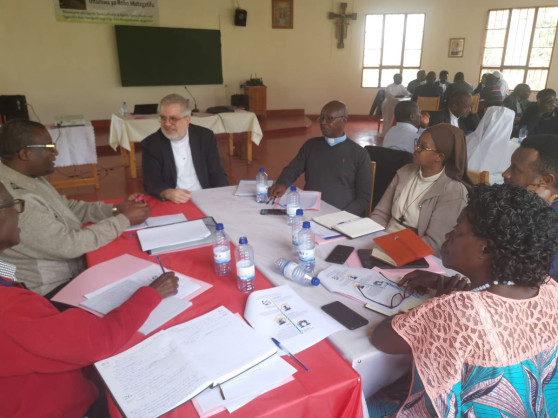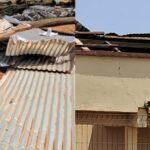About fifty delegates (bishops, priests, men and women religious, laymen and laywomen) from all the dioceses of Rwanda gathered from 2 to 6 March in Mbare to delve into the topic of ‘how can we become more of a synodal Church in mission in Rwanda, based on the guidance provided by the synodal path.’
Responding to Pope Francis’ call, Mgr Edouard Sinayobye, Bishop of Cyangugu and a member of the Assembly, orchestrated this ‘school of synodality’ to allow participants to further explore key themes that surfaced during the synod process, using the Final Document as a starting point. The participants also engaged in the synodal style of listening and discernment, including dedicated time for Lectio Divina.
“The synod process in our dioceses has been a time of grace and renewal,’ shared Mgr Sinayobye. ‘The Church in Rwanda is eager for communion and unity, desiring to journey together and care for all. With my fellow bishops, we convened this assembly to nurture true ‘missionaries of synodality’ in our Christian communities, making this collaborative journey a way of ecclesial life. This gathering itself was an authentic synodal experience: a time of mutual listening and communal discernment to understand where the Holy Spirit is leading the Church in Rwanda, guided by the Synod’s Final Document”.
The Rwandan Bishops’ Conference organized the meeting, which saw the participation of Fr Giacomo Costa, SJ, Consultor of the General Secretariat of the Synod, who facilitated the proceedings and provided insights to train participants in a synodal approach.
“Acknowledging that the implementation phase of the Synod must build on past efforts and leverage the outcomes, the work began by reviewing the synodal journey thus far,” highlighted Father Giacomo Costa SJ. ‘I witnessed the tremendous work done during the listening phase by the Rwandan diocesan synod teams, engaging even the most marginalized individuals. Their role was crucial and will continue to be as the synodal journey progresses. Many shared the expectations of the faithful who actively partook in the listening phase and are awaiting responses. It became evident during the sessions that the heart of the implementation process is not just about imparting document content or offering solutions, but about creating an experience that helps people recognize the beauty of walking together and the transformative power of listening to one another. Ultimately, it is about realizing that every baptized individual is accountable for the Church’s mission”.
In a message to the participants, Cardinal Mario Grech emphasized that “the Synod on Synodality is not concluded; it is now transitioning into its primary phase”. The Final Document “has been entrusted – or rather, returned – to all local Churches to guide the third phase, that of implementation or reception”.
According to the Secretary General of the General Secretariat of the Synod, “no document or reform can truly make an impact unless it aligns with the unique journeys of the Churches, which vary in terms of history, culture, traditions, potential, and challenges. The reception process inherently involves inculturation, a concept in which African Churches have always been pioneers”.
Applauding the “genuinely ecclesial” nature of the Rwandan bishops’ initiative, Cardinal Grech highlighted how “synodality, before being a doctrine, is a style, a mindset, a culture: a Church approach where episcopal ministry, despite its essential centrality, is exercised ‘in collaboration’ with the diverse ministries and charisms bestowed by God for the world’s evangelization”.
The initiative by the Rwandan Bishops’ Conference is one of several endeavors undertaken by local churches or church entities. More information on such initiatives can be found on the website: www.SynodResources.org
Distributed by APO Group on behalf of Synodus Episcoporum.








